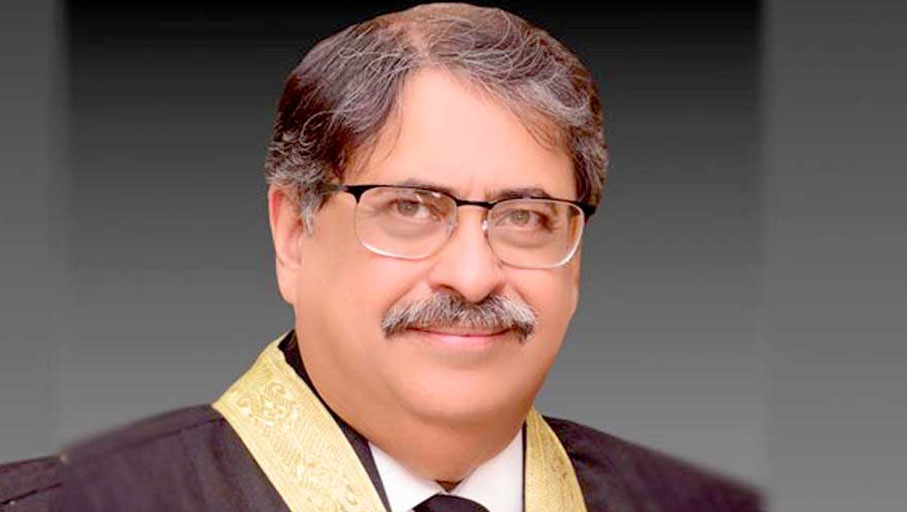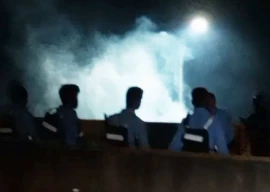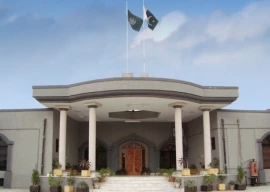
The Islamabad High Court (IHC) on Monday expressed displeasure over the practice of enforced disappearances, with IHC Chief Justice Athar Minallah wondering if senior government officials can be tried under Article 6 of the Constitution.
During a hearing of the case pertaining to the disappearance of journalist and poet Mudasir Naaru, IHC Chief Justice Athar Minallah said if the practice of whisking people away continued, then the court will initiate proceedings under Article 6 and include the "chief executives" in the case too.
Justice Minallah said there was no accountability in Pakistan, adding that the Commission for Inquiry of Enforced Disappearances was formed but it does nothing except postpone hearings.
He said, “There are thousands of families whose loved ones have gone missing, but no one bothers with them”.
The IHC chief justice further said there was no “state within a state” in Pakistan as the country has a Constitution and laws but still no investigations were conducted in the missing persons cases.
The state is responsible for these missing persons and this practice should be ended, he added. Justice Minallah said even a terrorist cannot be extra-judicially killed and asked who has the authority to label another person a terrorist.
If such practice is to be enforced, an SHO will pick people up for talking against him, the judge warned.
Attorney General Khalid Jawed Khan said Naaru’s family met Prime Minister Imran Khan earlier this month and the government was serious about the recovery of the missing person, adding that the government needed more time to submit a report on the matter.
About Justice Minallah’s Article 6 remarks, the AGP said that even the government couldn’t implement the sentences given under Article 6, while adding that it was also important for the federal government to keep national security in view.
Read Missing persons traced to K-P detention centre, SHC told
Justice Minallah then stated that the court could decide for the government and hold all past and incumbent chief executives responsible for the heinous practice.
A person went missing in Islamabad last year and then it was said he had gone to the Northern Areas for a picnic, the IHC CJ said, adding that there was an impression that enforced disappearance was the policy of the state.
The chief justice further said he does not know if the media is free or not, but if it were, then pictures of the missing persons would have been on the front page.
“Either the chief executive take responsibility for the missing persons or he hold his subordinates [involved in this practice] accountable,” the IHC CJ added.
Justice Minallah added that the practice of enforced disappearances has been going on in Pakistan since the 1970s. "Former military dictator Gen Pervez Musharraf admitted to this crime in his autobiography but still, there was no action against him," he added.
AGP Khan said not every issue can be fixed by the courts as some issues can only be resolved by people themselves. “They should come out on streets [to protest],” he said, adding that since the 70s extra-judicial murders have been taking place in Pakistan.
Justice Minallah responded that the court verdict can also fix issues if the government can identify the ones responsible for this practice.
“When there is an impression that the state is involved in these crimes, then nothing can be more serious than that,” he added.
He said the government can show its seriousness by prosecuting the individuals who admitted to making people disappear forcibly.
AGP Khan said he was ready to assist the court in the matter as he supported democracy and rule of law. Naaru’s counsel Iman Mazari also expressed her willingness to assist the bench.
The case was then adjourned till Jan 18.



1729080111-0/BeFunky-collage-(63)1729080111-0-165x106.webp)
1730838202-0/Trump-(1)1730838202-0-165x106.webp)















COMMENTS
Comments are moderated and generally will be posted if they are on-topic and not abusive.
For more information, please see our Comments FAQ